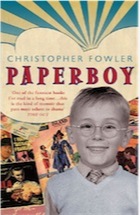 The author of the Bryant and May detective novels, amongst many others, describes his childhood and teen years in this lovely, evocative memoir. With a father cowed by his own domineering mother, a mother who thought she might come to love the man she married, this lonely child withdrew into the world of books, encouraged by an elderly librarian who let him read adult books provided they were not removed from the library, and cinema, where he learned to love British films. Like lots of men (I think it is a particularly male practice) he kept lists - notebooks full of lists in fact, and what lists they were, films seen, books read, books to read, ideas for books not yet written, etc. He also has a photographic memory for things long gone - Spangles, Mivvi's, Saturday morning pictures and the smell of old cinemas, Frys Mint Creams; he brings a smile to your face because of that, and a tear to your eye for his loneliness both at home and at school. If you were brought up in the 1950s and 60s, you will remember lots of things here including outside toilets and Barry Bucknell's DIY craze, but even if you are younger, this glimpse into the world of a boy who desparately wanted to write but didn't know how to get going will entertain you hugely.
The author of the Bryant and May detective novels, amongst many others, describes his childhood and teen years in this lovely, evocative memoir. With a father cowed by his own domineering mother, a mother who thought she might come to love the man she married, this lonely child withdrew into the world of books, encouraged by an elderly librarian who let him read adult books provided they were not removed from the library, and cinema, where he learned to love British films. Like lots of men (I think it is a particularly male practice) he kept lists - notebooks full of lists in fact, and what lists they were, films seen, books read, books to read, ideas for books not yet written, etc. He also has a photographic memory for things long gone - Spangles, Mivvi's, Saturday morning pictures and the smell of old cinemas, Frys Mint Creams; he brings a smile to your face because of that, and a tear to your eye for his loneliness both at home and at school. If you were brought up in the 1950s and 60s, you will remember lots of things here including outside toilets and Barry Bucknell's DIY craze, but even if you are younger, this glimpse into the world of a boy who desparately wanted to write but didn't know how to get going will entertain you hugely. NB: [from The Guardian, Dec 2010] Last December, Christopher Fowler won the inaugral Green Carnation Award for this book. Paul Magrs (Never the Bride and others), who is a lecturer on the Manchester Metropolitan University's creative writing MA, helped set up the Green Carnation prize earlier this year after realising there was no literary award for gay men's books in the UK. He described the lack of such a prize as "scandalous", saying: "There ought to be something that celebrates and publicises the breadth and variety of their work. Writing by gay men can be funny, exciting, harrowing, uplifting and challenging – and it can range right across the genres. It can also be created by men from all classes and races." The prize, which has no cash value, is named after the green carnation historically sometimes worn as an emblem of homosexuality – Oscar Wilde often carried one on his lapel.


